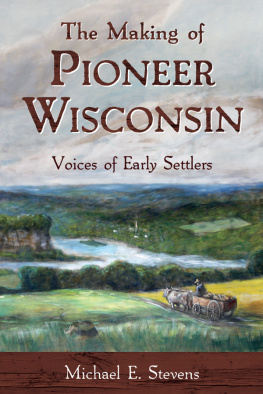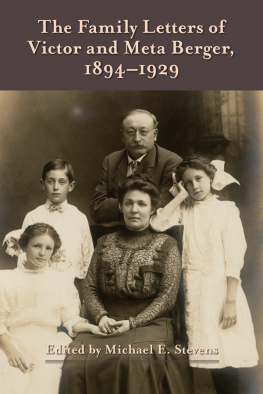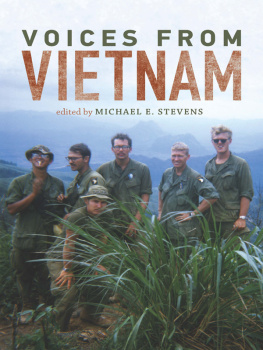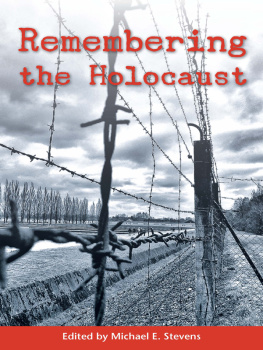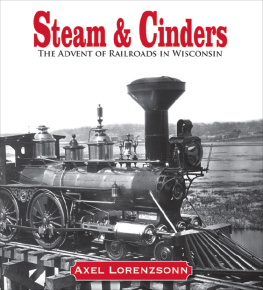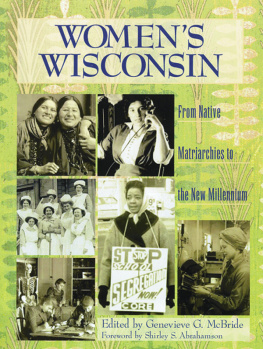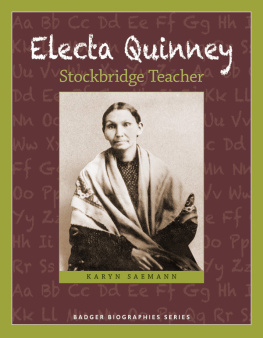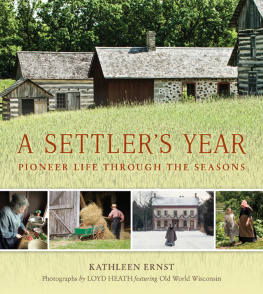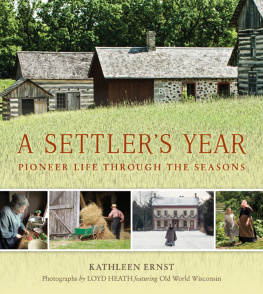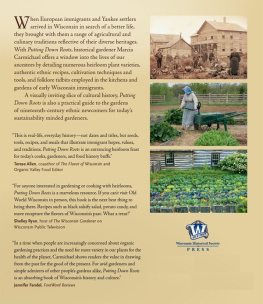The Making of Pioneer Wisconsin

Published by the Wisconsin Historical Society Press
Publishers since 1855
Ebook edition 2018
The Wisconsin Historical Society helps people connect to the past by collecting, preserving, and sharing stories. Founded in 1846, the Society is one of the nations finest historical institutions.
Join the Wisconsin Historical Society: wisconsinhistory.org/membership
2018 by the State Historical Society of Wisconsin
Excerpts from Harry H. Anderson, ed., German-American Pioneers in Wisconsin and Michigan: The Frank-Kerler Letters, 1848-1864 (Milwaukee: Milwaukee County Historical Society, 1971), reprinted with permission of Milwaukee County Historical Society.
Excerpts from Theodore Christian Blegen, Land of Their Choice: The Immigrants Write Home (University of Minnesota Press, 1955), copyright 1955 by the University of Minnesota, renewed 1983.
Excerpts from Gunnar J. Malmin, trans. and ed., America in the Forties: The Letters of Ole Munch Rder (University of Minnesota Press, 1929), copyright 1929 by the University of Minnesota, renewed 1957.
For permission to reuse material from The Making of Pioneer Wisconsin: Voices of Early Settlers (ISBN: 978-0-87020-889-8; e-book: 978-0-87020-890-4), please access www.copyright.com or contact the Copyright Clearance Center, Inc. (CCC), 222 Rosewood Drive, Danvers, MA 01923, 978-750-8400. CCC is a not-for-profit organization that provides licenses and registration for a variety of users.
The cover image, depicting a Wisconsin landscape in 1848, is one of fourteen agricultural murals commissioned for and originally displayed at the 1948 Wisconsin State Fair in celebration of the states centennial. Donation and restoration of the murals was made possible through the generous financial support of the Kohler Foundation, Inc. The nine remaining murals are preserved in the Wisconsin Historical Societys permanent collections.
Photographs identified with WHI or WHS are from the Societys collections; address requests to reproduce these photos to the Visual Materials Archivist at the Wisconsin Historical Society, 816 State Street, Madison, WI 53706.
Designed by Ryan Scheife, Mayfly Design
22 21 20 19 18 1 2 3 4 5
Library of Congress Cataloging-in-Publication Data
Names: Stevens, Michael E., author.
Title: The making of pioneer Wisconsin : voices of early settlers / Michael E. Stevens.
Description: Madison, Wisconsin : Wisconsin Historical Society Press, [2018] | Includes bibliographical references and index. |
Identifiers: LCCN 2018013991 (print) | LCCN 2018021743 (ebook) | ISBN 9780870208904 (EBook) | ISBN 9780870208898 (pbk. : alk. paper)
Subjects: LCSH: Frontier and pioneer lifeWisconsin. | PioneersWisconsinBiography. | PioneersWisconsinSources. | ImmigrantsWisconsinHistory19th century. | WisconsinEmigration and immigrationHistory19th century. | German AmericansWisconsinHistory19th centurySources.
Classification: LCC F584 (ebook) | LCC F584 .S74 2018 (print) | DDC 977.5/03dc23
LC record available at https://lccn.loc.gov/2018013991
For Elise, Hugo, and Lila-Rose
CONTENTS
The Making of Pioneer Wisconsin tells the story of how a half million people uprooted themselves from familiar surroundings, traveled across vast distances, adapted to different environments, and created a new society. It is a process that has been repeated over millennia at different times and places. This story focuses on a generation of pioneer settlers who came to Wisconsin from the mid-1830s through the 1850s. In a twenty-five-year period, they helped grow Wisconsins population from a little more than eleven thousand in 1836 to more than a half million in 1855 and more than three quarters of a million by 1860.
Rather than offering a traditional narrative, this book presents the stories of pioneer men, women, and even children in their own words. By reading their letters, diaries, and other writings, we become aware of their emotions and see the world through their eyes. The documents selected for this volume primarily focus on the ordinary stuff of lifemoving to a new place, setting up a household, finding a spouse, making a living, keeping and discarding old customs, and contributing to a community. They offer vivid descriptions and the emotional reactions of a generation dealing with rapid change. What did it feel like to move to a new place that was being rapidly populated? How did settlers adapt to others who had different customs, traditions, languages, and ways of life? How did they experience weddings, childbirth, sickness, and depression in their new surroundings? How did they make a living in a new land? This mass migration included English-speakers from the eastern United States as well as Europeans who spoke a variety of languages. Despite their differencesand there were manythe early settlers of Wisconsin shared a common story of being uprooted, adapting, and building something new. Now, of course, we know how their stories turned out, but the future was uncertain for these settlers at the time of their writing, and they documented the process with both excitement and trepidation. Collectively, they provide us with the authentic voices of Wisconsins pioneers.
The story is told in three chaptersbookended by a prologue and an epiloguecovering the settlers migration, adaptation, and creation of communities. The prologue reminds us that pioneer settlements were built on losses borne by Wisconsins Native peoples, who were subject to a federal policy that aimed to remove all Indian Americans west of the Mississippi River. In 1830, the Native population of Wisconsin outnumbered the non-Native population. But by 1850, the white population outnumbered the Native population by fifty to one. In a speech by Hoowanneka (or Little Elk) included in the prologue, the Ho-Chunk orator compares his tribes interactions with the French, the English, and finally the Americans. He plaintively closes by asking American treaty negotiators, Do you want our country? For the Ho-Chunk, the unfortunate answer was yes.
Not only were the tribes physically displaced, but their separate, distinct cultures as Ho-Chunk or Ojibwe or Menominee soon became blended in settlers minds under the single word Indian or red man. Only a few of the pioneers represented in this volume actually met individual American Indians. Instead, they held in their mind an image of the Indian, characterized by derogatory words such as depraved, uncivilized, or wild that could be used to contrast with the world they hoped to create.
The first chapter focuses on the experience of coming to Wisconsin after Indian land cession treaties had been signed and large numbers of American Indians had been removed. Many settlers described the desire to move as an itch, or a fever, impelling them to satisfy their curiosity and explore this new place. New Englander Henry Eggleston expressed it well, telling his wife, I got thinking about Wisconsin and the more I thought about it, the more I wanted to see. Published and unpublished reports of newly available land circulating in the eastern states and in Europe inspired thoughts about Wisconsin. Christian Traugott Ficker, a German immigrant who settled in Mequon, even published a guidebook in his native country called Friendly Adviser for All Who Would Emigrate to America and Particularly to Wisconsin.
After settlers decided to move west, they experienced the journeywhether over land or by waterin different ways. Teenager Sarah Foote kept a diary of her familys trip west by wagon. Passing her Ohio schoolhouse provoked the saddest of all leave-takings, but she soon found the trip exciting. On her arrival in Wisconsin she told her diary: So now here we are all of us, ready to begin life in the woods. Charles Minton Baker, who came west from Vermont by wagon as well as by a Great Lakes ship, found the trip unpleasant. He commented on the incredible variety of humanity he encountered, from almost every tongue & nation the rich & poor, the civil & uncivil, the neat & quiet, the noisy & dirty, the pious & praying, the impious & swearing, the genteel & fashionable & gay, & the ragged & filthy & disgusting. Noting the crying & scolding & snoring & groaning, Baker said it was a scene which I do not soon wish to experience again. Those who crossed the ocean often faced the greatest challenges. Ocean travelers described disputes between immigrants from different countries, bad food, and rough seas in which none of us could remain on our feet. At the same time, some settlers were also moved by unexpected glimpses of whales and icebergs. Once on dry land, the travelers had to get to their destination in the West and find a way to make a living. One immigrant was pleased with the good wages he found in Mineral Point but lamented the gender imbalance, complaining about all the bachelors in his area. He told his friend in England, You might bring a flock of lassies.

